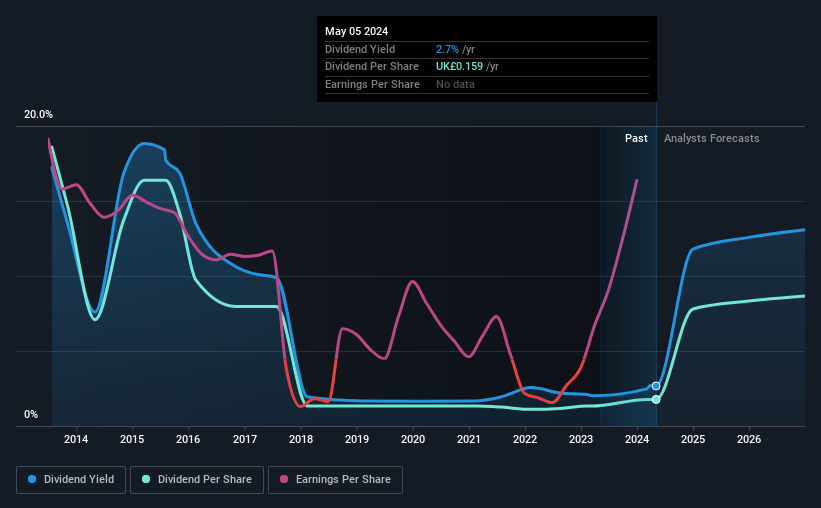Stock Analysis
- United Kingdom
- /
- Insurance
- /
- LSE:LRE
Here's What We Like About Lancashire Holdings' (LON:LRE) Upcoming Dividend

Regular readers will know that we love our dividends at Simply Wall St, which is why it's exciting to see Lancashire Holdings Limited (LON:LRE) is about to trade ex-dividend in the next 3 days. Typically, the ex-dividend date is one business day before the record date which is the date on which a company determines the shareholders eligible to receive a dividend. The ex-dividend date is an important date to be aware of as any purchase of the stock made on or after this date might mean a late settlement that doesn't show on the record date. Accordingly, Lancashire Holdings investors that purchase the stock on or after the 9th of May will not receive the dividend, which will be paid on the 7th of June.
The company's next dividend payment will be US$0.15 per share, and in the last 12 months, the company paid a total of US$0.20 per share. Based on the last year's worth of payments, Lancashire Holdings has a trailing yield of 2.7% on the current stock price of UK£5.96. Dividends are a major contributor to investment returns for long term holders, but only if the dividend continues to be paid. That's why we should always check whether the dividend payments appear sustainable, and if the company is growing.
See our latest analysis for Lancashire Holdings
Dividends are typically paid out of company income, so if a company pays out more than it earned, its dividend is usually at a higher risk of being cut. Lancashire Holdings paid out just 15% of its profit last year, which we think is conservatively low and leaves plenty of margin for unexpected circumstances.
Generally speaking, the lower a company's payout ratios, the more resilient its dividend usually is.
Click here to see the company's payout ratio, plus analyst estimates of its future dividends.

Have Earnings And Dividends Been Growing?
Stocks in companies that generate sustainable earnings growth often make the best dividend prospects, as it is easier to lift the dividend when earnings are rising. If earnings fall far enough, the company could be forced to cut its dividend. That's why it's comforting to see Lancashire Holdings's earnings have been skyrocketing, up 48% per annum for the past five years.
Many investors will assess a company's dividend performance by evaluating how much the dividend payments have changed over time. Lancashire Holdings's dividend payments per share have declined at 21% per year on average over the past 10 years, which is uninspiring. It's unusual to see earnings per share increasing at the same time as dividends per share have been in decline. We'd hope it's because the company is reinvesting heavily in its business, but it could also suggest business is lumpy.
To Sum It Up
From a dividend perspective, should investors buy or avoid Lancashire Holdings? Companies like Lancashire Holdings that are growing rapidly and paying out a low fraction of earnings, are usually reinvesting heavily in their business. This strategy can add significant value to shareholders over the long term - as long as it's done without issuing too many new shares. Overall, Lancashire Holdings looks like a promising dividend stock in this analysis, and we think it would be worth investigating further.
In light of that, while Lancashire Holdings has an appealing dividend, it's worth knowing the risks involved with this stock. Every company has risks, and we've spotted 1 warning sign for Lancashire Holdings you should know about.
If you're in the market for strong dividend payers, we recommend checking our selection of top dividend stocks.
Valuation is complex, but we're helping make it simple.
Find out whether Lancashire Holdings is potentially over or undervalued by checking out our comprehensive analysis, which includes fair value estimates, risks and warnings, dividends, insider transactions and financial health.
View the Free AnalysisHave feedback on this article? Concerned about the content? Get in touch with us directly. Alternatively, email editorial-team (at) simplywallst.com.
This article by Simply Wall St is general in nature. We provide commentary based on historical data and analyst forecasts only using an unbiased methodology and our articles are not intended to be financial advice. It does not constitute a recommendation to buy or sell any stock, and does not take account of your objectives, or your financial situation. We aim to bring you long-term focused analysis driven by fundamental data. Note that our analysis may not factor in the latest price-sensitive company announcements or qualitative material. Simply Wall St has no position in any stocks mentioned.
About LSE:LRE
Lancashire Holdings
Provides specialty insurance and reinsurance products in London, Bermuda, Australia, and the United States.
Very undervalued with excellent balance sheet.

